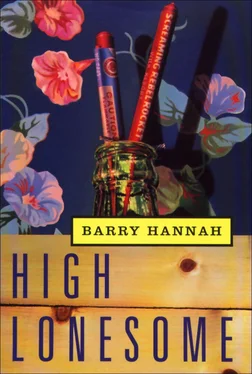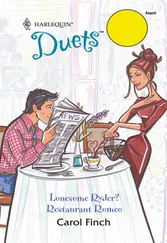I won’t tell Mary everything, but it’s necessary I listen to her, because I’m beginning to feel threatened, without consummation, only long preparation by our words, our merchandise, and our car wrecks. A certain song had come out I’d heard on the FM, and now I owned it. By Radiohead. The name of it exactly: “Creep.” It is a haunting thing, sung by a creep to a goddess oblivious to him. I think of Elton. “What am I doing here? ” the creep pleads, and it hits me very deeply, a pain of perfect acknowledgment. Why do I like it so much? Why has Mary asked me to please quit playing it over and over, paying no attention to the other songs on the CD? What am I so tranced about? she demands. Why don’t you go out and just rake her down, the doctor’s ex-fox? Not all women are good. Some women have tragic pussies, she pushed on to get to my head. I’d never heard Mary use a bad word and I stopped the music.
“There’s something wrong with women who talk and wait and plan too much. My friend. Why you? There are certainly others more in her league. Why is she still in town, even?” she says.
Now I’m truly scared in my concupiscence, my ready loins, my thighs with some muscle definition all sightly from private squats with seventy pounds on my shoulders, my calves corded and well-tennised — these secret extraordinary gifts all for her waiting. But I frown at good Mary. Then comes the patient smile and the hooded eyes, taught by example by my own father in home combat. “I wish I was special! But I’m a creep!” the defeated tenor of Radiohead howls. “I don’t belong here!”
God what freedom in that statement. I just adore it and am terrified too.
Elton, at last confessed, at last! Elton! Forgive my abuse, little rich man!
Besides buying various rugs, mats, futons, pillows, and even sleeping bags for us to have our earnest postures on in different rooms together, Jane is planning her own home for the first time in her life, she says. Her dearly own. It will be a tour. I sense I am something of an agent of travel for her. The home is going up north of the city, near a lake, on a hill with big trees and hanging moss around it. She stands spread-legged like Marilyn over that grate in New York in the empty boarded air of her rooms, while I watch her high eloquent rump and tennis legs, just a slight burn of tan on them, and fine ankles into slung-back short heels. With her back to me I can almost bring back the Brazilian, Elton’s bride. She intends to be “courted” this time. She wants stages. She loves it that we met on the tennis courts, like college children. I’d been so long without a woman, I could wait and get excited only in the head for a while, as you can get unhungry by not eating long enough. I think I had not, until Jane, ever had dessert at a restaurant and stared slyly for two hours at every twitch of a woman’s eyebrows, blue in the groin. I go to bed alone. No, really, it is not disagreeable. My head language becomes cleaner, my instincts have a sudden balm, and I feel right tidy in this love, if that’s what I have.
A nun once told me she had been constantly in love all her life, a sweet mental love more superb and wider than any touching could supply.
“Impossible,” I said.
“Well damn you,” she added, “Mister.”
She too must have guessed I was a creep, because her voice had run out scarily as from another person sitting beside her on the airplane. And she was shocked. I was shot with cold.
I have lately thought about my birthplace, St. Louis, and what is wrong there. Eminent creeps have issued from there as by some necessity of the environment. T. S. Eliot and William Burroughs, maybe they are profound, but does anybody miss the sluggish dead-staring creep quality in them either? Jane is also from there. I could never quite decide about the hipster of my New York summer, the paragon, Miles Davis, who in his autobiography gave us the nice term country hip for bluesmen along the river. But sometimes there was a rancid flatness to him, even beyond his heroin glare. The surgeon’s wife — I call her that when I put her away a bit to study — loves the right clothes, I love the right clothes, and Miles Davis held them near sacred. I want to be country hip like Davis’s friends, smooth as a modest flower behind the counter of the parts store. Jane seems more born in the latest shift, her hair fluffed casually by some fag offstage, impeccable.
She told me one afternoon the only other man she had loved since her husband was a man dying of cancer whose intensity in life and lovemaking was so beautiful it made her cry, and she knew I’d do that for her too. I could almost feel myself at that moment writhing in her arms like a dolphin on dry land.
I worry that I’ve buried and denied the fact there were so few truly admirable adults during my upbringing in St. Louis. Were they there and I was such a creep I missed them all? Did they all become just a little less vicious as they aged, more reconciled and easy, simply because they had no more teeth and were horrified that they’d be ignored and scorned? These men and women became softer and kinder, with infinite patience too, especially with their grandchildren. But I did not trust them. It has been said about a successful painting acquaintance of mine — by quick Mary — an only child rather clubby in his friendships with “real” men like hunters and other painters of the hard-angled quotidian, that once he had got all he could out of unkindness, he turned to kindness. Then I regard the spacial grace of Indian tennis players. Places do make people. There was a family in St. Louis I lived with, sleeping with their divorced mother. Only her son, the more Southern one for some reason, with his easy strength, his quiet voice, his hesitation to judge, was bearable. The daughter, every day on the backseat of the car as she was taken to school, said, demanding: “Turn on the radio, please.” The please just an irony in her mouth, in a flat, mean voice. The mother obliged as if hypnotized, never pausing to find that rock-and-roll button for the brat. One day I couldn’t bear it any longer, but when she was out of the car to school I did not attack. Rather I started weeping because of the sadness of being around this hugely indulged vixen, and I knew love would die soon because I couldn’t stand the home life that made her possible.
The long study that idiots give themselves, the endless excuses of the weak and vicious. The willingness to go public with hideous disease as if that were the primary goal in life. Why else am I writing? Two men were playing beside me on the next tennis court last spring. They were, as they hit the ball, yelling to each other about their exercises, their protein intake, their reps, their lats, their pecs, their squats. Screaming their charts at one another. Later on one of them smiled at me in a café as if we were close buddies, since I had been there to listen, nothing amiss here, hands out my kindred. I had a hard time frowning him off, this monster. His body looked to me like something foul and bought, a meat suit.
Now the house is done, Thanksgiving has passed, and I have had Jane in all her rooms with the ardor of long dreamers, and the wait proves all worth it, an instance where the flesh has really gone into more pleasures than even the dreams. But I knew she was wonderful, and that begging for minor disaster seemed artificial, like something I had cultivated from a book by a French existentialist in college, just in order to seem properly grave.
Not especially Sartre or Camus, but much of college now anyway seems like an endless qualification and rebuke to pleasure by the same kind of middle-aged people I grew up with, so that the bean of the reasonable and moderate would grow to the size of a tree in the head you could barely see out of by the time you became an adult yourself, thus to sit in your room and review the world, choked by moderation in all things. I did not see happy middle-aged men until I began going to roadhouses to hear and watch, more, rhythm-and-blues musicians, some of them with white hair and bellies, having a fine time on what must have been sub-minimum wages. I hold no brief for the universal holiness of African-Americans that goes down as commandment in much of the press today. But I was overwhelmed by the sight of dark older Americans having fun. Most, I loved them for their bellies. They’d been having it a long time, on much good collards, fatback, and cheap whiskey.
Читать дальше












